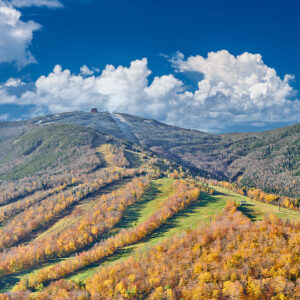Environmental conservation efforts are crucial for the longevity of New Hampshire’s farms and forests, as well as for the people who rely on these spaces to make a living, sustain communities, and recreate outdoors.
It is important that we look toward the future to identify and address forthcoming challenges while making sure to maintain the character of our state. New Hampshire needs to retain this character as an appealing place to live for generations of Granite Staters and new residents alike. Balancing the continued responsible use of our natural resources with the needs of the people and communities who utilize them will be at the forefront of my leadership of the State Conservation Committee (SCC).
The SCC is composed of representatives of state natural resource agencies, county Conservation Districts, and other key partners that work collaboratively to facilitate conservation efforts. This is done through technical, educational, and financial assistance for farmers, forest land managers, and private landowners throughout the state. You may be familiar with many of the agencies that are involved in the committee, such as your local Conservation District, the Department of Agriculture, Markets and Food, Fish and Game Department, and the Department of Environmental Services.
The committee also annually awards around $400,000 in grants for conservation projects across the state as part of the “Moose Plate” program. The SCC is involved in efforts to improve forest and soil health, water quality, wildlife habitat, and farm viability throughout the state.
It is the mission of the SCC to facilitate the efforts of local conservation commissions and county-based conservation districts by connecting their work with related efforts and resources around the state. From a programmatic standpoint, I want to develop systems for helping organizations improve their efforts, educational offerings, and member recruitment. The committee has the ability to connect local efforts with state and federal agencies to help them reach their goals.
As a state-level organization, the SCC has a responsibility to represent and support conservation organizations and their activities. As executive director, I will strive to use the resources and connections of the SCC to support local conservation organizations and organizers in ways they may not be able to accomplish with limited resources available to them. This means working with local and state legislators to ensure continued support for New Hampshire’s natural resources and the communities that rely on them. I plan on advocating for New Hampshire’s natural resources and the farmers, forest landowners, and land managers who value their maintainable use and management.
I also want to be aware of what’s going on regionally and nationally. Conservation issues occurring in New Hampshire are most likely occurring in other places in New England. In this role, I have the opportunity to build and leverage relationships with similar organizations in other states to be able to generate new ideas and solutions to the conservation issues we face.
As our natural resources need to be managed for long-term use, we also need to be developing New Hampshire’s conservation community of the future. A major goal for my time as director of the SCC is to develop and facilitate a sustainable vision of collaborative management of New Hampshire’s natural resources for long-term use. That involves identifying and engaging with New Hampshire conservationists of the future and entails multiple pieces.
The first is to identify and support conservation efforts from historically underrepresented communities. I intend to provide what support I can to ensure their efforts are funded and supported. The second is to provide opportunities for students to learn about land management and conservation and find New Hampshire-based conservation jobs. This can be done through developing partnerships with New Hampshire’s universities to create opportunities for internships and summer work, as well as developing K-12 environmental education throughout the state. I want to continue to expand the number of people involved in conservation efforts into the future.
As executive director of the SCC, my goal is to help guide the conservation community forward in a way that strengthens our natural resources and the people and communities that rely on them. As we push towards a future that is more collaborative and informed, my hope is that the State Conservation Committee will serve as a “chamber of commerce” for New Hampshire conservation.
I’d encourage readers who have questions to check us out online or go to mooseplate.com. I can also be reached at ian.p.hanley@agr.nh.gov.





